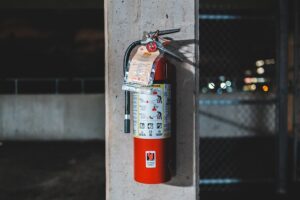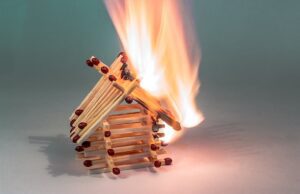Essential Fire Safety Tips for Homeowners
As a homeowner, you are responsible for protecting your family from the risk of fire. This includes installing smoke detectors in every room of your home as well as in your garage, basement, and furnace area. If you are looking for essential fire safety tips for homeowners, read on!
Place smoke detectors in each room of your residence
You should install smoke detectors in every room of your home, including the garage and basement. If you have a furnace room or other area where heaters are located, you should also install a detector there.
Install smoke detectors according to the manufacturer’s instructions and check them regularly to make sure they’re working properly. To check the smoke detector’s batteries:
● Press down on the button on top of it (if there is one) until you hear a chirping sound or see flashing lights that indicate that it is working properly
● If there’s no button on top of it, simply wave at its lens
How to be prepared<
It’s essential to know how to get out of each room, as well as what’s around you that could be flammable or otherwise dangerous. If you’re unfamiliar with your home, consider drawing up a map and marking these things out, so you don’t waste time trying to locate them when an emergency happens. Also, be sure that everyone in the household is aware of where the fire extinguishers are located and know how to use them properly!

Keep flammable items away from the stove
The stove is a major source of fires in the home. Some easy ways to keep your family safe include:
● Keep flammable materials away from the stove
● Never leave cooking unattended, even for a moment. Small children can easily knock over pots and pans onto the stove and start an accidental fire
● if they’re left alone with it
● Don’t use your oven as storage space (this goes for your refrigerator, too). You should use cabinets designed expressly for storing food items instead of using enclosed spaces like cupboards or drawers within an appliance such as a refrigerator or freezer—they’re made specifically for that purpose
Check smoke alarms and fire extinguishers
Check smoke alarms and fire extinguishers, which are essential fire safety tips for homeowners:
● Check the batteries in your smoke alarms every six months
● Replace the batteries in your smoke alarm at least once a year, and replace them with new ones if they’re more than ten years old
● Check that there is no rust on your fire extinguisher handle or nozzle and that it’s not damaged. Also, make sure that it can still hold pressure by pressing down on the top of the container with just one finger for about 2 seconds—if it feels like nothing happened, then you have a good seal, and your extinguisher is ready to go! If you see any changes to either of these things, bring it into a service station for inspection before use.
Understand how to use a fire extinguisher in an emergency
A fire extinguisher is an essential safety tool for any home, as advised by our consultants from Teddy Moving and Storage. It can be the difference between an accidental fire and a costly catastrophe. It’s important to know how to use your fire extinguisher in case of an emergency, so make sure you are familiar with the following steps:
● Check if it’s full and still good by checking the gauge on top of it once every year or two, or if you notice that it looks as if there is less liquid inside now than when you bought it
● Read what type of fire each one is labeled for—this information should be right on top next to where you pull off its cap (usually, this will be a number printed in red ink)
● Hold the handle firmly up close against your shoulder with one hand when using an upright model, then aim straight at whatever item is on fire with your free hand

Never leave food cooking on the stove unattended
● Always remove food from the stove when it is done cooking, no matter what type of fuel you’re using to cook with
● Don’t leave a pot on the stove with the burner turned off. This can cause an accidental fire because heat continues to build up inside the pan and may ignite splatters or spilled grease around the edges
● Make sure to turn off all burners when you’re finished cooking for the day, especially if you’re going out or leaving someone else home alone to tend to your house and pets
Keep your home clean by picking up clutter, cleaning grease buildups
Clutter and grease buildups are the most common culprits. The best way to avoid these is to keep your home clean by picking up clutter, cleaning grease buildups, etc. Clean under stoves and other heavy appliances so that no dust or debris can accumulate there. Any danger that could result in harm shouldn’t be tolerated if you want to move something from home. If you plan and know to use the right materials, you can move with something important like your fine art. Hiring professionals to handle protecting fine art when moving frequently results in the best protection.

Regularly clean out the fireplace so that ashes aren’t smoldering on the floor below it. Keep paper, cardboard, and other flammable items away from the stove when you’re cooking because they can ignite easily at high temperatures (especially if you are using an electric range).
Don’t overload plugs
You should also be sure not to overload plugs with too many appliances. This can cause the outlet itself to overheat and lead to a fire. If you have several things running at once, it’s best to use a surge protector or power strip. This will help keep your furniture from getting damaged in case of an electrical short in any of your devices.
Conclusion on fire safety tips for homeowners
While we hope you never have to use these tips in an emergency, it’s important to be prepared for anything. The best way to do this is by being proactive and taking these essential fire safety tips for homeowners to prevent fires from starting.
